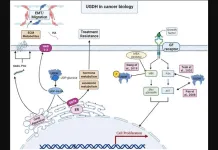(Press-News.org) The Ohio State University (OSU) has been awarded a $20 million Tobacco Center of Regulatory Science (TCORS) grant from the Food and Drug Administration’s (FDA) Center for Tobacco Products and National Institutes of Health.
The OSU-TCORS grant is a collaboration of experts from the colleges of medicine, public health and law organized and implemented through the Center for Tobacco Research at The Ohio State University Comprehensive Cancer Center – Arthur G. James Cancer Hospital and Richard J. Solove Research Institute (OSUCCC – James).
Ohio State is one of seven centers across the United States selected to conduct research aimed at gathering scientific evidence needed to better inform the FDA’s regulation of tobacco products. TCORS grant recipients are selected based on a rigorous review of scientific and technical skills and the relevance of proposed projects to TCORS program priorities. Since the TCORS program was founded in 2013, the NIH and FDA have funded 29 centers to conduct tobacco regulation science research in the fields of epidemiology, economics, toxicology and marketing.
Maximizing public health through research
Led by Theodore Wagener, Ph.D., and Peter Shields, M.D., the OSU-TCORS research grant is organized around the theme of “Flipping the Script” and uses the tobacco industry’s nicotine playbook to improve public health through four research projects:
Informing e-cigarette nicotine regulations to promote public health
Project leaders: Ahmad El Hellani, PhD, Environmental Health Sciences, and Wagener, who is the Leonard J. Immke, Jr. and Charlotte L. Immke Chair in Cancer Research at the College of Medicine
This project will study how manipulating the different dimensions of nicotine affect how much smokers and e-cigarette users like the products, how often they use them, and how harmful they are. It will also examine if there is a way to regulate nicotine that makes e-cigarettes unattractive to young people and non-users while still giving smokers a less harmful and satisfying alternative.
Informing oral nicotine pouch regulations to promote public health
Project leaders: Brittney Keller-Hamilton, Ph.D., MPH College of Medicine, and Marielle Brinkman, College of Public Health
This project will examine how the various dimensions of nicotine affect the appeal, addictiveness, and use or oral nicotine pouches. Researchers will also look at how these factors influence product switching – for example, from smokeless tobacco or combustible cigarettes to pouches. In addition, the study will look at how the use of these products impacts the microbiome of pouch users compared to cigarette and smokeless tobacco users.
Nicotine product claims on appeal, perceptions and usage behaviors
Leader: Darren Mays, Ph.D., MPH, assistant dean for research, College of Medicine
This project will examine how features of oral nicotine pouch packaging affect the appeal, use, and perceptions of pouches among young people and whether these features create preferences for pouches compared to e-cigarettes, cigarettes and smokeless tobacco. The ultimate goal of the project is to determine how product packages should be regulated so that they are appealing to adult tobacco users but with minimal appeal to young people.
Naturalistic assessment of e-cigarette and oral nicotine pouch use among adolescents and young adults
Leaders: Amy Ferketich, Ph.D., and Megan Roberts, Ph.D., both of the College of Public Health
This project is a two-year prospective observational study of 2,000 youths and young adults from across the United States to identify marketing exposures and product design characteristics that drive continued use, product escalation and nicotine dependence. This study will give particular attention to the impact on populations historically targeted by the tobacco industry.
Training opportunities in tobacco regulatory science
The OSU-TCORS grant also provides undergraduates, predoctoral graduate students, postdoctoral trainees and early career faculty with exposure, training and experience in tobacco regulatory sciences to advance researchers toward becoming independent tobacco scientists. The career enhancement core includes:
Mentored postdoctoral research training opportunities in tobacco regulatory science;
Annual pilot research funding for mentored research projects that align with overarching goals of OSU-TCORS projects;
10-week summer undergraduate training program in tobacco regulatory science;
Research-in-progress meetings where faculty and trainees can present research in progress for feedback, including concepts under development, preliminary findings and planned projects or proposals for funding;
A Mary Ellen Wewers Seminar Series that will monthly feature scientists whose research cuts across interdisciplinary aspects of tobacco regulatory science.
Real-time monitoring of the tobacco industry
Historically, the tobacco industry has manipulated nicotine in combustible cigarettes and smokeless tobacco products, like chewing tobacco, to sustain dependence among existing users but also to increase their appeal and addictiveness for young people and non-users. This has resulted in products that have addicted millions of people, explained Wagener, who directs the Center for Tobacco Research at the OSUCCC – James. He says the industry is now using similar strategies to promote e-cigarette and oral nicotine pouch use, especially among young people.
“This grant allows us to conduct critical research to guide the FDA’s regulation of nicotine in e-cigarettes and oral nicotine pouches. We argue that just as the industry manipulates nicotine in its products to ignite epidemic use, effective, science-based regulation of nicotine has the potential to spur major public health victories. Our ultimate goal is to determine what regulations will lead to reduced youth use of e-cigarettes and oral nicotine pouches while at the same time support smokers and smokeless tobacco users looking to switch to less harmful alternatives,” said Wagener, co-principal investigator of the OSU-TCORS grant.
A marketing monitoring core will conduct real-time surveillance of the tobacco industry to collect economic-impact data on product sales in both online and brick-and-mortar stores. This team will identify product attributes such as nicotine concentrations, source (tobacco vs. synthetic) and claims on product packaging to help understand how the industry’s manipulation of nicotine has impacted product appeal, usage patterns and health toxicity.
Also, a product evaluation and manipulation core will gather data about tobacco product design characteristics – including the chemical, physical and bacterial properties of nicotine components and how they affect product appeal, addictiveness and toxicity. This team will also formulate e-cigarette liquids and oral nicotine pouches for use in the studies.
To learn more about the Center for Tobacco Research and OSU-TCORS programs, visit cancer.osu.edu/CTR.
###
END
Ohio State awarded $20 million to put science behind tobacco product regulation
2023-10-04
ELSE PRESS RELEASES FROM THIS DATE:
Both high and low HDL cholesterol tied to increased risk of dementia
2023-10-04
EMBARGOED FOR RELEASE UNTIL 4 P.M. ET, WEDNESDAY, OCTOBER 4, 2023
MINNEAPOLIS – Having either high or low levels of high-density lipoprotein (HDL) cholesterol, or “good” cholesterol, is tied to a small increased risk of dementia in older adults, according to a study published in the October 4, 2023, online issue of Neurology®, the medical journal of the American Academy of Neurology. This study does not prove that high or low levels of HDL cholesterol cause dementia; it only shows an association.
“Previous studies on this topic have been ...
Meadow Spittlebug’s record-breaking diet also makes it top disease carrier for plants
2023-10-04
New research fueled in part by citizen scientists reveals that the meadow spittlebug—known for the foamy, spit-like urine released by its nymphs—can feed on at least 1,300 species of host plants, more than twice the number of any other insect.
The study, which is published today in the journal PLOS ONE, could be especially important in the effort to stop the bug from spreading a type of bacterium that has caused the death of crops across the world, including olive trees in Italy, grapevines in California, citrus trees in South America, and almond trees in Spain.
“Thirteen hundred host plants means 1,300 opportunities ...
Keshav Pingali to receive ACM-IEEE CS Ken Kennedy Award
2023-10-04
ACM, the Association for Computing Machinery, and IEEE Computer Society have named Keshav Pingali, the W.A.”Tex” Moncrief Chair of Grid and Distributed Computing at the University of Texas at Austin, as the recipient of the 2023 ACM-IEEE CS Ken Kennedy Award. The Ken Kennedy Award recognizes groundbreaking achievements in parallel and high performance computing. Pingali is cited for contributions to high-performance parallel computing for irregular algorithms such as graph algorithms. He is also cited for leadership on the Galois Project, which provides a unifying framework for parallelizing both irregular and regular algorithms.
Pingali has made deep and wide-ranging ...
Pandemic boosted gardening, hunting in NYS
2023-10-04
A survey of New York state residents found that nearly half of respondents increased the amount of time they spent on wild and backyard food in the early months of the COVID-19 pandemic, confirming anecdotes about increases in activities such as sourdough baking, fishing and gardening. People also tended to eat the food they produced, researchers found, possibly buffering the generally less healthful eating that was common at the time.
“This was the period of 2020 when you couldn't find tomato cages, seeds were out of stock, and there were reports about record numbers of people hunting and ...
Study identifies jet-stream pattern that locks in extreme winter cold, wet spells
2023-10-04
Winter is coming—eventually. And while the earth is warming, a new study suggests that the atmosphere is being pushed around in ways that cause long bouts of extreme winter cold or wet in some regions.
The study’s authors say they have identified giant meanders in the global jet stream that bring polar air southward, locking in frigid or wet conditions concurrently over much of North America and Europe, often for weeks at a time. Such weather waves, they say, have doubled in frequency since the 1960s. In just the last few years, they have killed hundreds of people and ...
Department of Defense grant awarded to study metastasis in bladder cancer
2023-10-04
A Weill Cornell Medicine researcher has received a $610,000 grant from the Department of Defense to investigate the mechanisms causing DNA instability that potentially drives metastasis in bladder cancer. The research also aims to identify methods to intercept this spread. The Peer-Reviewed Cancer Research Program (PRCRP) Idea Award funds innovative, high-risk, high-reward basic cancer research. One of the goals of the PRCRP program is to decrease the burden of cancer on service members and their families, veterans, and the American public.
“Approximately 40% of patients with muscle-invasive bladder cancer develop metastases, where ...
Simultaneous large wildfires will increase in Western U.S.
2023-10-04
Contacts:
David Hosansky, UCAR/NCAR Manager of Media Relations
hosansky@ucar.edu
720-470-2073
Audrey Merket, UCAR/NCAR Science Writer and Public Information Officer
amerket@ucar.edu
303-497-8293
Simultaneous outbreaks of large wildfires will become more frequent in the Western United States this century as the climate warms, putting major strains on efforts to fight fires, new research shows.
The new study, led by scientists at the National Center for Atmospheric Research (NCAR), focused on wildfires of 1,000 acres or larger. It found that wildfire seasons in which ...
New UCF technology could reduce lag, improve reliability of online gaming, meetings
2023-10-04
Whether you’re battling foes in a virtual arena or collaborating with colleagues across the globe, lag-induced disruptions can be a major hindrance to seamless communication and immersive experiences.
That’s why researchers with the University of Central Florida’s College of Optics and Photonics (CREOL) and the University of California, Los Angeles, have developed new technology to make data transfer over optical fiber communication faster and more efficient.
Their new development, a novel class of optical modulators, is detailed in a new study published recently in the journal Nature Communications. Modulators can be thought of as like a light switch that controls certain ...
Rice alum Louis Brus awarded Nobel Prize in Chemistry
2023-10-04
Rice University alumnus Louis Brus (’65) has been awarded the Nobel Prize in Chemistry for the “discovery and development of quantum dots,” nanosized particles with unique properties “that now spread their light from television screens and LED lamps,” according to a Royal Swedish Academy of Sciences announcement today.
Brus, who started his undergraduate education at Rice in 1961, shares the distinction with Moungi Bawendi and Alexei Ekimov. Their work has been crucial to the development of nanotechnology, which has helped drive major computing ...
UGDH in clinical oncology and cancer biology
2023-10-04
“Given the potential challenges of directly inhibiting UGDH, therapeutic strategies may extend to targeting downstream pathways and upstream substrates.”
A new review paper was published in Oncotarget's Volume 14 on September 28, 2023, entitled, “UDP-glucose dehydrogenase (UGDH) in clinical oncology and cancer biology.”
UDP-glucose-6-dehydrogenase (UGDH) is a cytosolic, hexameric enzyme that converts UDP-glucose to UDP-glucuronic acid (UDP-GlcUA), a key reaction in hormone and xenobiotic metabolism and in the production of extracellular matrix precursors.
In this review, researchers Meghan J. Price, Annee D. Nguyen, Jovita K. Byemerwa, ...




